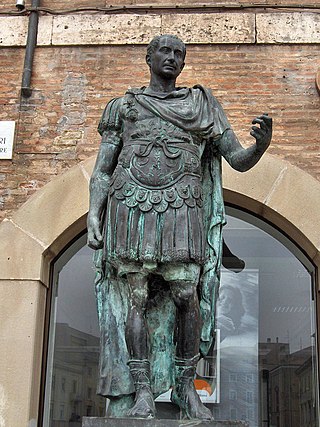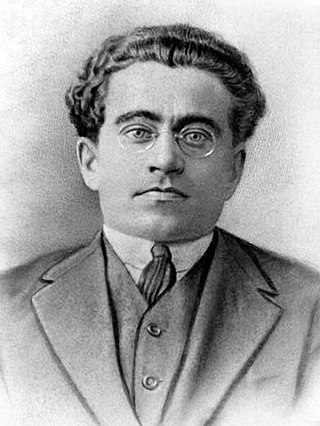Related Research Articles

Hegemony is the political, economic, and military predominance of one state over other states. In Ancient Greece, hegemony denoted the politico-military dominance of the hegemon city-state over other city-states. In the 19th century, hegemony denoted the "social or cultural predominance or ascendancy; predominance by one group within a society or milieu" and "a group or regime which exerts undue influence within a society".

Antonio Francesco Gramsci was an Italian Marxist philosopher, journalist, linguist, writer, and politician. He wrote on philosophy, political theory, sociology, history, and linguistics. He was a founding member and one-time leader of the Italian Communist Party. A vocal critic of Benito Mussolini and fascism, he was imprisoned in 1926 where he remained until his death in 1937.
An ideology is a set of beliefs or philosophies attributed to a person or group of persons, especially those held for reasons that are not purely epistemic, in which "practical elements are as prominent as theoretical ones." Formerly applied primarily to economic, political, or religious theories and policies, in a tradition going back to Karl Marx and Friedrich Engels, more recent use treats the term as mainly condemnatory.

In Marxist philosophy, cultural hegemony is the dominance of a culturally diverse society by the ruling class who manipulate the culture of that society—the beliefs and explanations, perceptions, values, and mores—so that the worldview of the ruling class becomes the accepted cultural norm. As the universal dominant ideology, the ruling-class worldview misrepresents the social, political, and economic status quo as natural, inevitable, and perpetual social conditions that benefit every social class, rather than as artificial social constructs that benefit only the ruling class.
Neo-Gramscianism applies a critical theory approach to the study of international relations (IR) and the global political economy (GPE) that explores the interface of ideas, institutions and material capabilities as they shape the specific contours of the state formation. The theory is heavily influenced by the writings of Antonio Gramsci. Neo-Gramscianism analyzes how the particular constellation of social forces, the state and the dominant ideational configuration define and sustain world orders. In this sense, the neo-Gramscian approach breaks the decades-old stalemate between the realist schools of thought and the liberal theories by historicizing the very theoretical foundations of the two streams as part of a particular world order and finding the interlocking relationship between agency and structure. Karl Polanyi, Karl Marx, Max Weber, Max Horkheimer, Theodor Adorno and Michel Foucault are cited as major sources within the critical theory of IR.

Caesarism is an authoritarian or autocratic ideology inspired by Julius Caesar. It has been used in various ways by both proponents and opponents as a pejorative.

In postcolonial studies and in critical theory, the term subaltern designates and identifies the colonial populations who are socially, politically, and geographically excluded from the hierarchy of power of an imperial colony and from the metropolitan homeland of an empire. Antonio Gramsci coined the term subaltern to identify the cultural hegemony that excludes and displaces specific people and social groups from the socio-economic institutions of society, in order to deny their agency and voices in colonial politics. The terms subaltern and subaltern studies entered the vocabulary of post-colonial studies through the works of the Subaltern Studies Group of historians who explored the political-actor role of the common people who constitute the mass population, rather than re-explore the political-actor roles of the social and economic elites in the history of India.
Posthegemony or post-hegemony is a period or a situation in which hegemony is no longer said to function as the organizing principle of a national or post-national social order, or of the relationships between and amongst nation states within the global order. The concept has different meanings within the fields of political theory, cultural studies, and international relations.

In political philosophy, particularly Frankfurt School critical theory, advanced capitalism is the situation that pertains in a society in which the capitalist model has been integrated and developed deeply and extensively and for a prolonged period. The expression advanced capitalism distinguishes such societies from the historical previous forms of capitalism, mercantilism and industrial capitalism, and partially overlaps with the concepts of a developed country; of the post-industrial age; of finance capitalism; of post-Fordism; of the spectacular society; of media culture; and of "developed", "modern", and "complex" capitalism.
A dominant culture is a cultural practice that is dominant within a particular political, social or economic entity, in which multiple cultures co-exist. It may refer to a language, religion/ritual, social value and/or social custom. These features are often a norm for an entire society. An individual achieves dominance by being perceived as pertaining to a majority of the population and having a significant presence in institutions relating to communication, education, artistic expression, law, government and business. The concept of "dominant culture" is generally used in academic discourse in fields such as communication, sociology, anthropology and cultural studies.

Stephen Gill, FRSC is Distinguished Research Professor of Political Science at York University, Toronto, Ontario, Canada. He is known for his work in International Relations and Global Political Economy and has published, among others, Power and Resistance in the New World Order, Power, Production and Social Reproduction, Gramsci, Historical Materialism and International Relations (1993), American Hegemony and the Trilateral Commission (1990) and The Global Political Economy: Perspectives, Problems and Policies.

Passive revolution is a transformation of the political and institutional structures without strong social processes by ruling classes for their own self-preservation. The phrase was coined by the Marxist politician and philosopher Antonio Gramsci during the interwar period in Italy.

The Prison Notebooks are a series of essays written by the Italian Marxist Antonio Gramsci. Gramsci was imprisoned by the Italian Fascist regime in 1926. The notebooks were written between 1929 and 1935, when Gramsci was released from prison to a medical center on grounds of ill-health. His friend, Piero Sraffa, had supplied the writing implements and notebooks. Gramsci died in April 1937.
Marxism is a method of socioeconomic analysis that originates in the works of 19th century German philosophers Karl Marx and Friedrich Engels. Marxism analyzes and critiques the development of class society and especially of capitalism as well as the role of class struggles in systemic, economic, social and political change. It frames capitalism through a paradigm of exploitation and analyzes class relations and social conflict using a materialist interpretation of historical development – materialist in the sense that the politics and ideas of an epoch are determined by the way in which material production is carried on.

In Marxist theory, society consists of two parts: the base and superstructure. The base refers to the mode of production which includes the forces and relations of production into which people enter to produce the necessities and amenities of life. The superstructure refers to society's other relationships and ideas not directly relating to production including its culture, institutions, roles, rituals, religion, media, and state. The relation of the two parts is not strictly unidirectional. The superstructure can affect the base. However, the influence of the base is predominant.
In Marxist theory, false consciousness is a term describing the ways in which material, ideological, and institutional processes are said to mislead members of the proletariat and other class actors within capitalist societies, concealing the exploitation intrinsic to the social relations between classes.
Crisis theory, concerning the causes and consequences of the tendency for the rate of profit to fall in a capitalist system, is associated with Marxian critique of political economy, and was further popularised through Marxist economics.
Media hegemony is a perceived process by which certain values and ways of thought promulgated through the mass media become dominant in society. It is seen in particular as reinforcing the capitalist system. Media hegemony has been presented as influencing the way in which reporters in the media – themselves subject to prevailing values and norms – select news stories and put them across.
Marxist cultural analysis is a form of cultural analysis and anti-capitalist cultural critique, which assumes the theory of cultural hegemony and from this specifically targets those aspects of culture which are profit driven and mass-produced under capitalism.
The Old is Dying and the New Cannot be Born is a 2019 nonfiction book by American author Nancy Fraser, published by Verso Books.
References
- ↑ Martin, James (2002). Antonio Gramsci: Marxism, philosophy and politics. Routledge. ISBN 0-415-21749-0.
- ↑ Brasil: ¿en crisis orgánica? La Izquierda Diario. 9 march 2016.
- ↑ Simon, Roger (2002). Gramsci's Political Thought. Lawrence & Wishart. ISBN 978-19-098-3179-7.
- ↑ "Crisis Orgánica y Revolución Pasiva. Americanismo y Corporativismo" (PDF). Cinta de Moebio. Revista de Epistemología de Ciencias Sociales. 2001.
- ↑ "Crise orgânica e revolução passiva: o inimigo toma a iniciativa". Fundação de Estudos Políticos, Econômicos e Sociais Dinarco Reis. 24 June 2016.